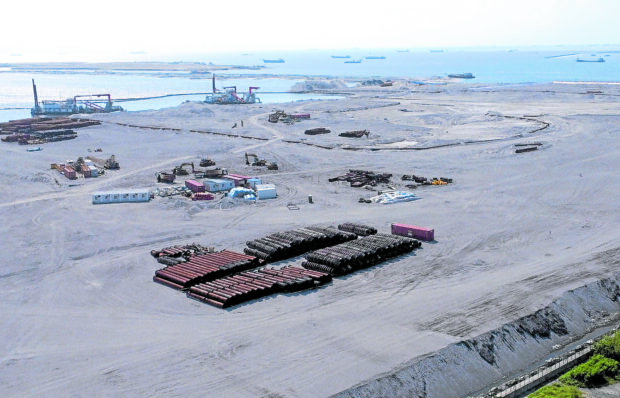
The reclamation site in Manila Bay along J.W. Diokno Boulevard in Pasay City on Monday, August 14, 2023. The government suspends all reclamation activities in Manila Bay.INQUIRER PHOTO / GRIG C. MONTEGRANDE
MANILA, Philippines — A militant fisherfolk group, on Wednesday, asserted that the reclamation projects in Manila Bay would yield more significant adverse impacts compared to their supposed economic benefits for the country.
This was Pambansang Lakas ng Kilusang Mamamalakaya ng Pilipinas’s (Pamalakaya) response to Albay 2nd District Rep. Joey Salceda’s statement during the House Ways and Means Committee hearing on October 16 that the country will lose approximately P432 billion if the currently suspended reclamation projects are put on hold for up to five years.
Salceda said this amount will come from possible earnings from documentary stamp tax, capital gains tax, and the value-added tax.
Meanwhile, the Philippine Reclamation Authority (PRA) noted in the same meeting that the country could gain up to P23 trillion in direct investments from 14 approved reclamation projects in Manila Bay.
According to Pamalakaya, Salcedo and PRA did not consider the loss of livelihood for millions of fishermen and coastal families when determining the outcomes of the projects.
“The environmental and socio-economic costs, as well as risks of geological hazard of reclamation, are indeed far greater than its supposed economic gains. Rep. Salceda and the PRA did not consider the loss of livelihood of millions of fisherfolk and coastal families and the destruction of abundant marine and fishery resources caused by reclamation projects,” said Pamalakaya Vice Chairperson Ronnel Arambulo.
He furthered that marine and fishery resources and fishing activities have direct benefits to the majority of the people, the country’s food security, and local food production as compared to the income that will be generated from reclamation projects.
“The statements of the PRA and Rep. Salceda were merely speculations to justify the continuation of reclamation projects in Manila Bay that have been wreaking havoc on the livelihood of fisherfolk from the provinces of Bulacan, Cavite, Bataan, and several cities in Metro Manila,” Arambulo said.
He also mentioned that the PRA is responsible for the fishermen’s economic losses as it is the agency primarily promoting and facilitating the “destructive reclamation projects.”
The Pamalakaya official cited that in Bulacan and Cavite, fishermen were losing 70 to 80 percent of their usual income due to activities related to reclamation, such as dredging.
These losses were caused by “irreversible environmental impacts of reclamation such as fish catch depletion, massive destruction of fish habitats such as mangroves, seagrasses, and corals, and the worsening water quality,” Arambulo said.

